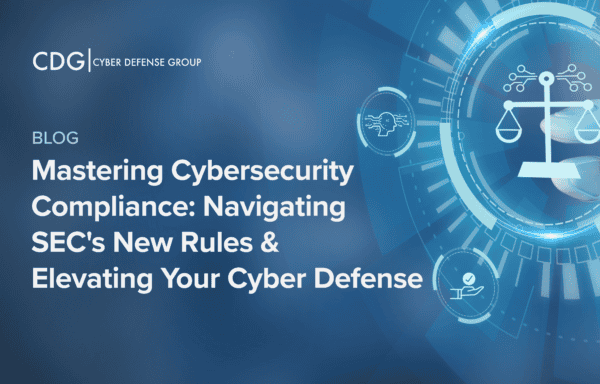Mastering SEC Cybersecurity Compliance Rules: Navigating New Regulations

Navigating the SEC cybersecurity compliance landscape
Navigating the intricate landscape of cybersecurity within the realm of public companies has taken on an even more regulated dimension. The imminent implementation of new Securities and Exchange Commission (SEC) Cybersecurity disclosure rules that take effect on September 5, 2023, is redefining the shape of compliance, particularly in terms of cyber risk management. The new mandates encompass a range of vital changes:
- Disclosures on Forms 10-K and 20-F, beginning with annual reports for fiscal years ending on or after December 15, 2023.
- Disclosures on Forms 8-K and 6-K will be required starting December 18, 2023.
- Smaller reporting companies must begin providing Form 8-K disclosures starting June 15, 2024.
Understanding the new SEC cybersecurity compliance rules

It’s crucial to note that these new regulations amplify prior SEC cybersecurity disclosure guidance and are not replacing them. In essence, these supplemental new rules will require public companies to disclose cybersecurity breaches that could have a material impact on their business within (4) business days. The new SEC rules also emphasize the importance of cybersecurity risk management, requiring public companies to provide annual disclosures about their cybersecurity risk management, strategy, and governance. Anyone that has done major Incident Response engagements will understand how hard this could be to accomplish for large breaches, where discovery and investigation can sometimes take weeks. It also increases the significance of Incident Response (IR) planning, particularly concerning the declaration of “incidents”.
Strategic incident response planning for cybersecurity risk management
The SEC’s final rules highlight the need for a comprehensive cybersecurity risk management strategy, ensuring that organizations have effective and efficient programs in place. There are many compliance regimes, such as Cybersecurity Maturity Model Certification (CMMC) (formerly Defense Federal Acquisition Regulation Supplement (DFARS), Health Information Technology for Economic and Clinical Health Act (HITEC) and General Data Protection Regulation (GDPR). Each of which strategically establishes a “shot-clock” for when a security incident or breach must be declared. The key here is to have a solid incident response plan tailored to the distinct requirements of each regulation, which includes the following:
- All anomalous activities that might escalate into a security incident should initially be called an “event.”
- The communications plans for discovering security events should have a clear reporting structure that limits the initial audience when events are discovered.
- If an event looks like it might be escalated, the IR plan must designate who the incident lead is, and outside counsel should be engaged for the purposes of privilege as soon as possible.
- There must be a reasonable period of investigation to determine the extent of a security event and its impact on data, especially regulated data, company confidential information, and customer and third-party impact.
- Only the designated IR Lead can declare an actual incident.
Enhancing transparency and accountability
The SEC’s new rules require public Companies must now assess their cybersecurity risks and develop incident response plans. Particularly regarding cybersecurity breaches that could have a material impact on their business. Companies must disclose a material cybersecurity incident, detailing what must be disclosed, when it must be disclosed, and the rationale behind using a materiality standard. This increased transparency will help investors make informed decisions by ensuring timely and consistent information about material cybersecurity incidents.
Strengthening legal and regulatory considerations for cybersecurity risks
The SEC has stated that it will enforce the new cybersecurity disclosure rules, helping to deter non-compliance and ensuring that public companies take cybersecurity seriously. Effective risk management is crucial in complying with the new SEC rules, including managing cyber risk, governance practices, and third-party risk assessment. Engaging outside legal counsel is an important collaboration between cybersecurity teams and legal experts.
Strategic incident response planning for cybersecurity risk management
Increased focus on cybersecurity: The SEC’s new rules will put a spotlight on cybersecurity for public companies, emphasizing the need to understand and manage cyber risks in incident response planning. Addressing cybersecurity threats is crucial in these plans to ensure that potential attacks are intercepted, reported, and mitigated effectively. Managing material risks from these threats involves assessing and dealing with significant risks, highlighting the role of management in evaluating and responding to cybersecurity challenges. This will likely lead to increased investment in cybersecurity measures and a heightened awareness of the risks cyberattacks pose. Having a well defined incident response plan that outlines the steps to be taken in the event of a breach, from immediate containment and mitigation to thorough investigation and communication strategies is crucial to minimizing damage and complying with the new rules.
Heightened transparency and accountability to disclose material cybersecurity incidents
Improved transparency: The SEC’s new rules will require public companies to enhance incident disclosure, particularly regarding cybersecurity breaches that could have a material impact on their business. Companies must disclose a material cybersecurity incident, detailing what must be disclosed, when it must be disclosed, and the rationale behind using a materiality standard. This will improve transparency for investors and help them to make informed decisions about their investments by ensuring timely and consistent information about material cybersecurity incidents. Underscoring the importance of robust incident detection and response mechanisms.
Legal and regulatory considerations for cybersecurity risks
Stronger enforcement: The SEC has said that it will take enforcement action against public companies and foreign private issuers that fail to comply with the new cybersecurity disclosure rules. This will help to deter non-compliance and ensure that public companies are taking cybersecurity seriously. Cybersecurity incidents that pose a substantial risk to national security or public safety may result in delayed reporting or warrant an extension period for disclosures. Effective risk management is crucial in complying with the new SEC rules, including managing cyber risk, governance practices, and third-party risk assessment. Engaging outside legal counsel is an important collaboration between cybersecurity teams and legal experts.
Steps for elevating your cybersecurity posture

In summary, the SEC’s recent cybersecurity disclosure rules are a proactive stride in safeguarding investor interests. However, it is important to note that these rules represent just one segment of a comprehensive strategy. Public companies must also take steps to improve their cybersecurity posture and implement robust protective security measures. Through such initiatives, they can not only fortify themselves from the risks of cyber threats, but also extend a shield of security to their valued investors. Unlocking a stronger cybersecurity stance is well within your reach as a public company. Here’s how you can make it happen:
Designate a Chief Information Security Officer (CISO)
Designate a CISO who can take the lead in developing and executing your company’s cybersecurity risk management strategy. This key individual will be your guide, ensuring that all cybersecurity initiatives are aligned and effective. If you’re struggling to hire a CISO, or if you don’t have the budget, you can accomplish this through an outsourced provider.
Embrace regular security assessments
Regular security assessments will act as a compass, guiding you away from potential cybersecurity pitfalls by identifying and managing material risks from cybersecurity threats. By systematically identifying and mitigating risks, you erect formidable defenses against potential breaches and vulnerabilities.
Empower your team through training
Your workforce is your first line of defense. By training employees on cybersecurity best practices and managing cyber risks, you arm them with the knowledge to recognize and thwart threats, like phishing attacks and malware. This proactive approach fortifies your company’s digital fortress.
Craft a comprehensive incident response blueprint
The key to success is preparation. A detailed plan for responding to a cybersecurity incident is crucial. This blueprint should outline steps for notifying affected parties, containing the incident, and the path to recovering from an incident. With this plan you’ll be able to tackle any unforeseen challenges head-on. By embracing these actionable steps, you’re not only bolstering your cybersecurity but you can ensure regulatory compliance. Remember, these steps are your roadmap to a more resilient digital landscape and creating a culture of vigilance and preparedness that safeguards your company and employees, as well as your investors and stakeholders.
Navigate the regulatory compliance landscape with a trusted partner
As you bolster your cybersecurity in the midst of evolving regulations, it’s crucial to recognize that you’re not tackling this challenge alone. At Cyber Defense Group, we can be a trusted partner on your journey towards effective cyber risk management and cyber resilience. Our comprehensive Cybersecurity Assessment services are tailored to help you navigate the intricacies of the new SEC rules and beyond. By partnering with us, you’re not only embracing compliance; you’re empowering your organization to thrive in a rapidly changing digital landscape. Let’s work together to ensure your cybersecurity posture remains strong, adaptable, and aligned with the demands of the future. Remember, cybersecurity is a shared responsibility. Get in touch with us today and take a proactive step towards a secure tomorrow. Find out more about our Security Assessments today!
Ready to book a meeting to discuss your cybersecurity strategy instead? Book your meeting directly here.
Liked what you read here? Then be sure to share with your co-workers and friends! You can also follow us on Twitter / X @CyberDefGroup or find us on LinkedIn.
